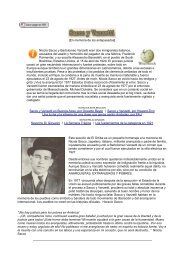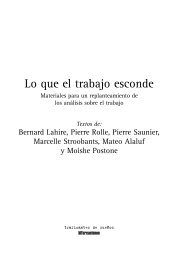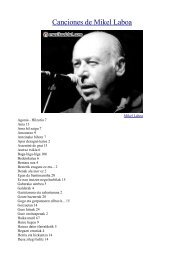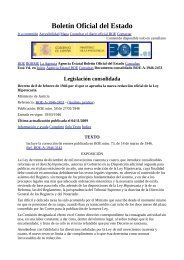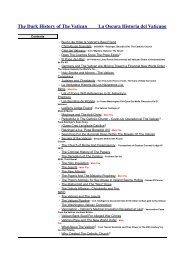The Invisible Man by H G Wells
The Invisible Man by H. G. Wells - Papeles de Sociedad.info
The Invisible Man by H. G. Wells - Papeles de Sociedad.info
Create successful ePaper yourself
Turn your PDF publications into a flip-book with our unique Google optimized e-Paper software.
"Why not?" said Kemp. "I didn't mean to interrupt."<br />
"It's very probably been killed," said the <strong>Invisible</strong> <strong>Man</strong>. "It was alive four days after, I know, and<br />
down a grating in Great Titchfield Street; because I saw a crowd round the place, trying to see<br />
whence the miaowing came."<br />
He was silent for the best part of a minute. <strong>The</strong>n he resumed abruptly:<br />
"I remember that morning before the change very vividly. I must have gone up Great Portland<br />
Street. I remember the barracks in Albany Street, and the horse soldiers coming out, and at last I<br />
found the summit of Primrose Hill. It was a sunny day in January—one of those sunny, frosty days<br />
that came before the snow this year. My weary brain tried to formulate the position, to plot out a<br />
plan of action.<br />
"I was surprised to find, now that my prize was within my grasp, how inconclusive its attainment<br />
seemed. As a matter of fact I was worked out; the intense stress of nearly four years' continuous<br />
work left me incapable of any strength of feeling. I was apathetic, and I tried in vain to recover the<br />
enthusiasm of my first inquiries, the passion of discovery that had enabled me to compass even the<br />
downfall of my father's grey hairs. Nothing seemed to matter. I saw pretty clearly this was a<br />
transient mood, due to overwork and want of sleep, and that either <strong>by</strong> drugs or rest it would be<br />
possible to recover my energies.<br />
"All I could think clearly was that the thing had to be carried through; the fixed idea still ruled me.<br />
And soon, for the money I had was almost exhausted. I looked about me at the hillside, with<br />
children playing and girls watching them, and tried to think of all the fantastic advantages an<br />
invisible man would have in the world. After a time I crawled home, took some food and a strong<br />
dose of strychnine, and went to sleep in my clothes on my unmade bed. Strychnine is a grand tonic,<br />
Kemp, to take the flabbiness out of a man."<br />
"It's the devil," said Kemp. "It's the palaeolithic in a bottle."<br />
"I awoke vastly invigorated and rather irritable. You know?"<br />
"I know the stuff."<br />
"And there was someone rapping at the door. It was my landlord with threats and inquiries, an old<br />
Polish Jew in a long grey coat and greasy slippers. I had been tormenting a cat in the night, he was<br />
sure—the old woman's tongue had been busy. He insisted on knowing all about it. <strong>The</strong> laws in this<br />
country against vivisection were very severe—he might be liable. I denied the cat. <strong>The</strong>n the<br />
vibration of the little gas engine could be felt all over the house, he said. That was true, certainly. He<br />
edged round me into the room, peering about over his German-silver spectacles, and a sudden dread<br />
came into my mind that he might carry away something of my secret. I tried to keep between him<br />
and the concentrating apparatus I had arranged, and that only made him more curious. What was I<br />
doing? Why was I always alone and secretive? Was it legal? Was it dangerous? I paid nothing but<br />
the usual rent. His had always been a most respectable house—in a disreputable neighbourhood.<br />
Suddenly my temper gave way. I told him to get out. He began to protest, to jabber of his right of<br />
entry. In a moment I had him <strong>by</strong> the collar; something ripped, and he went spinning out into his own<br />
passage. I slammed and locked the door and sat down quivering.<br />
"He made a fuss outside, which I disregarded, and after a time he went away.<br />
"But this brought matters to a crisis. I did not know what he would do, nor even what he had the<br />
power to do. To move to fresh apartments would have meant delay; altogether I had barely twenty<br />
pounds left in the world, for the most part in a bank—and I could not afford that. Vanish! It was<br />
irresistible. <strong>The</strong>n there would be an inquiry, the sacking of my room.<br />
"At the thought of the possibility of my work being exposed or interrupted at its very climax, I<br />
became very angry and active. I hurried out with my three books of notes, my cheque-book—the<br />
tramp has them now—and directed them from the nearest Post Office to a house of call for letters






